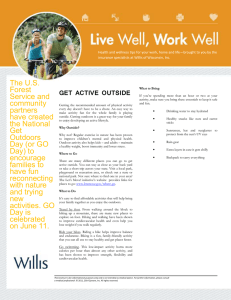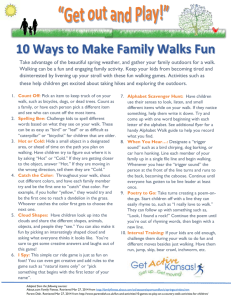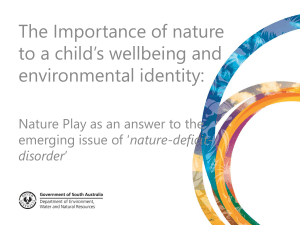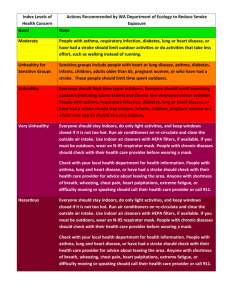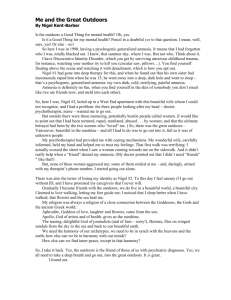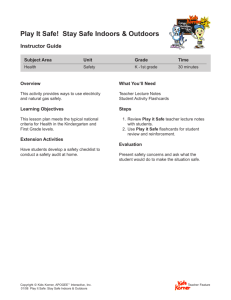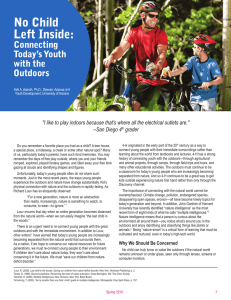The Mental Health Benefits of Physical Activity and
advertisement
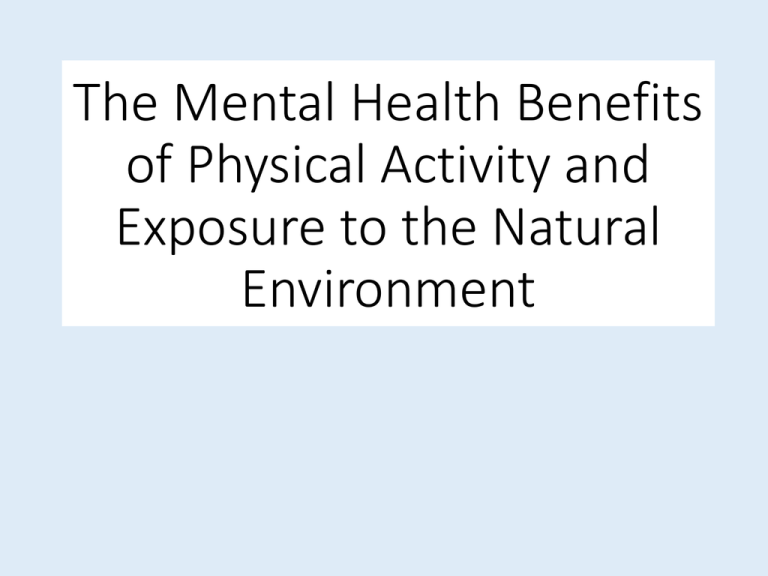
The Mental Health Benefits of Physical Activity and Exposure to the Natural Environment We live in stressful times - nearly 23% of Canadians report a 'high degree' of life stress. Regular exercise can be an effective, accessible antidote. Here are some of the numerous mental health benefits of exercise… Exercise Boosts Mood! • Exercise positively affects mood and energy levels • Diminishes symptoms of depression, such as social withdrawal, inactivity and feelings of hopelessness • Regular physical activity appears as effective as psychotherapy for treating mild to moderate depression • Regular exercise also helps to improves sleep, boosting day-time energy levels Exercise helps Manage Stress and Anxiety… • People who exercise report feeling less stressed or nervous • As little as five minutes of aerobic exercise (exercise which requires oxygen, such as a step class, swimming, walking) can stimulate anti-anxiety effects! The Natural Rush of Exercise… • Physical activity releases brain chemicals called endorphins, which: • • • • Relieve pain Enhance the immune system Reduce stress Delay the aging process • Time required to release endorphins varies - some people feel the rush after jogging for 10 minutes, while others will need to jog for half an hour Exercise Helps You Feel Good about Yourself… • Exercising can improve the way you perceive: • Your body • Your physical condition • Your athletic abilities • Exercise also enhances self-esteem and confidence And Share these Benefits with Others! • If you exercise as part of a group, you can enjoy the social benefits of exercise! • Group exercise allows you to interact with other people who share your interest in that activity, in a positive, energetic setting Upping the Ante - Taking Your Exercise Outdoors… • The idea that nature has healing properties is an ancient one • However, our lifestyles increasingly remove us from the natural world, and we spend more time interacting with technology and less time outdoors • Recent evidence is uncovering the benefits of nature • Merely viewing nature is associated with reduced stress, improved concentration, and greater well-being The Benefits of Being Outdoors • Just being outside leads to: • Decreased stress • Improved concentration • Enhanced mood • Mainstream medicine is starting to recognize our need for nature: Some doctors are prescribing time spent outdoors for their patients! • Those who experience the greatest threats to overall mental well-being have the most to gain from being in nature • People who experience high stress, low self-esteem, difficulty concentrating, and depressed mood experience the greatest benefits Exercising outdoors provides additional health benefits… • Walking or running in nature instead of indoors leads to: • Greater reductions in anger, tension, confusion, and depression • Larger improvements in positive affect, revitalization, and energy levels • Regular use of natural areas for physical activity can reduce the risk of mental health problems by 50% • Being active in natural settings even once a week might have a protective effect • Some people enjoy walking or running outdoors more so than indoors, therefore outdoor exercise might be easier to stick to! Exercising Outdoors Might Benefit the Natural World as Well! • An emerging field called “ecotherapy” studies therapeutic methods committed to both human and environmental health • Ecotherapy is a win – win framework! • As we recognize the health benefits nature has for us, we may increase our concern for the nature, benefitting the health of the environment as well as our own Regular outdoor exercise has numerous benefits for our physical and mental health, and may benefit the environment as well. So take a hike! References • Canadian Mental Health Association. (n.d.) Benefits of good mental health. Retrieved from http://www.cmha.ca/mental_health/benefits-of-good-mentalhealth/#.UzmbhvldVBF • Conservation Ontario. (2013). Your brain on nature - the mental benefits of getting outside. Retrieved from http://healthyhikes.ca/index.php/environmentyour-health/energize-your-body-and-mind • Minding Our Bodies. (2011). Making the case for integrating physical activity programming into mental health services. Retrieved from http://www.mindingourbodies.ca/toolkit/making_the_case_for_physical_activit y • Lines, Elizabeth. (2013). The nurture of nature: Natural settings and their mental health benefits. Retrieved from http://www.mindingourbodies.ca/about_the_project/literature_reviews/the_n urture_of_nature • Moll, Gewurtz, and Saltmarche. (2012). Vitamin green: How viewing, being and “doing” in nature affects our health and well-being. Retrieved from http://www.camhcrosscurrents.net/archives/autumn2012/vitamin_green.html
